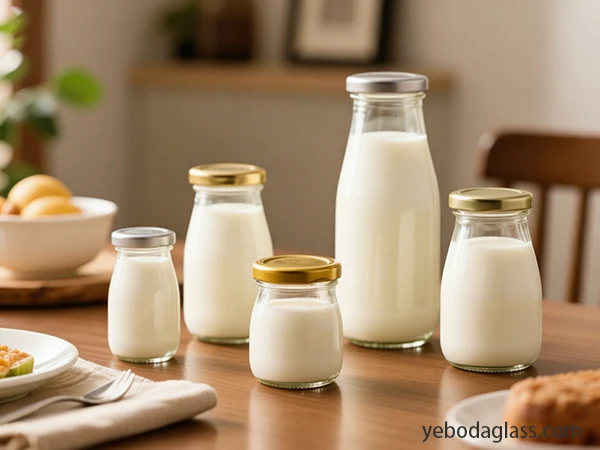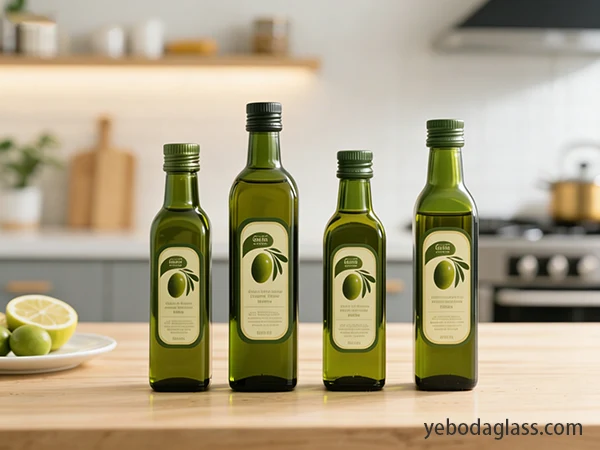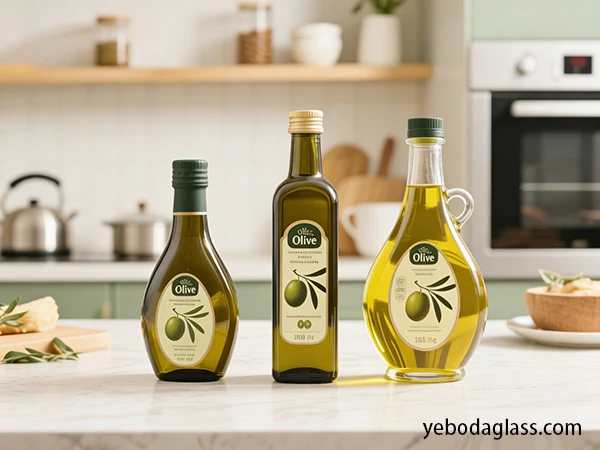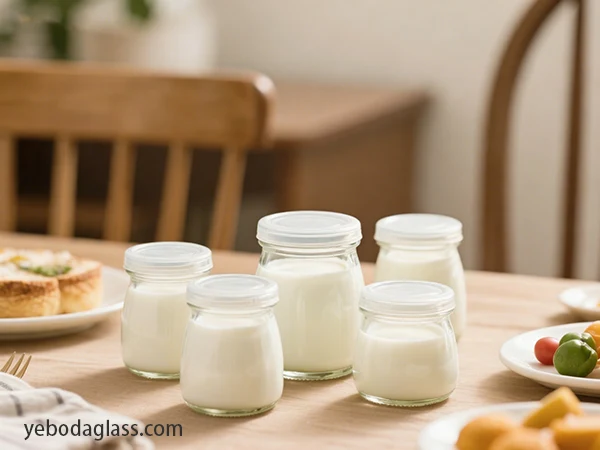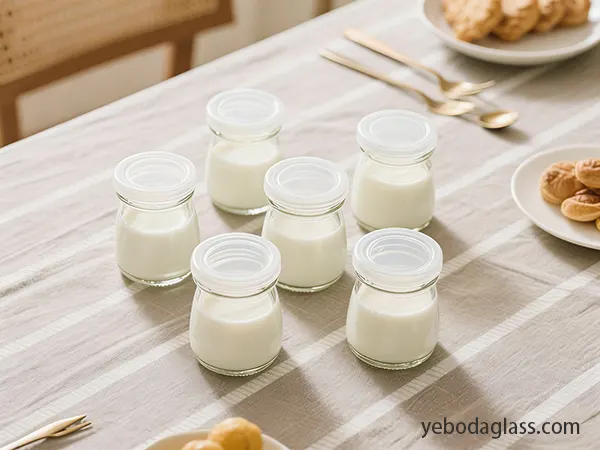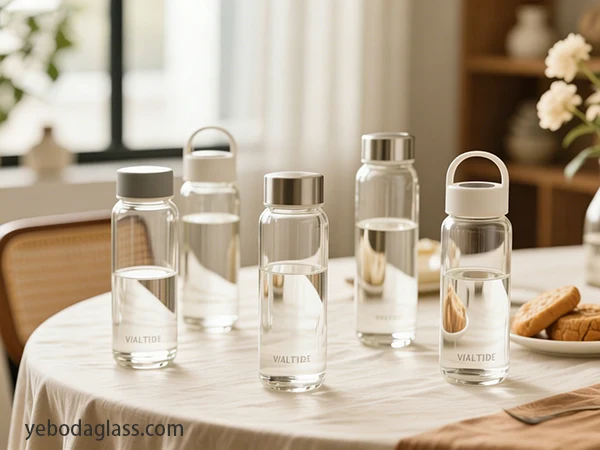Wprowadzenie
Niniejszy raport stanowi strategiczny przewodnik po wyborze hurtowych dostawców szklanych słoików na przyprawy, koncentrując się wyłącznie na istotnych czynnikach wykraczających poza wartość. Podkreśla on ustrukturyzowane podejście do definiowania wymagań zakupowych, analizy rynków docelowych i ustanowienia solidnej struktury oceny dostawców. Główne idee obejmują certyfikat jakości, minimalną wielkość zamówienia (MOQ), czas realizacji, zdolność adaptacji i etyczne praktyki zaopatrzeniowe. Raport porusza również kwestie szacowania wolumenu, oceny skalowalności, ograniczania ryzyka, stałych procesów due diligence, strategii dialogu oraz planu wdrożenia. Dzięki tej strukturze firmy mogą pozyskać niezawodnych, wysokiej jakości dostawców, którzy są w stanie dostosować się do ich celów operacyjnych i strategicznych, zapewniając tym samym spójne i ekonomiczne dostawy szklanych słoików na przyprawy.
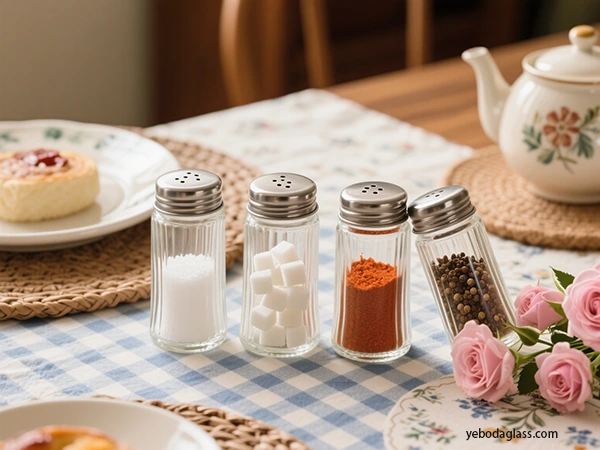
Zdefiniuj wymagania dotyczące zakupu
Wybór odpowiedniego szklanego słoika na przyprawy rozpoczyna się od dokładnego określenia specyfikacji produktu, aby dopasować go do planowanego zastosowania. Obejmuje to zwiększenie pożądanej pojemności, rodzaju pokrywki, kształtu słoika i jego właściwości fizycznych.
Kategorie pojemności i funkcjonalności
Pojemność: Szklane słoiki na przyprawy są dostępne w szerokiej gamie rozmiarów, zazwyczaj od 30 ml (1 uncji) do 470 ml (16 uncji), a popularne opcje to 300 ml (1 uncja), 600 ml (2 uncje), 600 ml (6 uncji) i 800 ml (8 uncji). Na specjalne zamówienie dostępne są również słoiki o dużej pojemności, nawet do 940 ml (32 uncje).
Typ pokrywy i opcja wyłączenia
- Typ pokrywy: Szeroka gama produktów z opcjami LID zapewnia świeżość i funkcjonalność. Opcje ogólne obejmują:
- Pokrywki plastikowe: Często dostępne w kolorze czarnym lub białym, często wyposażone w mieszadło umożliwiające kontrolowane dozowanie.
- Pokrywy metalowe: W tym pokrywki typu shaker z wkładką z tektury lub pokrywki zakręcane, czasami w wykończeniu takim jak złoto.
- Opcje hermetyczne: Korkowe wieczka zapewniają hermetyczne zamknięcie, idealne do zachowania jakości przypraw. Bambusowe wieczka to również estetyczne i ekologiczne rozwiązanie do zamykania.
- Pokrywy specjalistyczne: Garrafas de água de vidro premium de pequeno porte, projetadas para durabilidade, destaque da marca e produção em larga escala. Aumente o apelo da sua marca nas prateleiras e fortaleça sua imagem premium.
Kształty i rozważania dotyczące jakości materiałów
- Kształty: Preferowany kształt słoika zależy od wymagań estetycznych i funkcjonalnych produktu oraz marki. Typowe opcje obejmują:
- Okrągły: Klasyczny i wszechstronny.
- Fallstudie: Kleine Glaswasserflaschen für einen deutschen Vertriebshändler Dostępne w wersji francuskiej i regularnej kwadratowej, zapewniającej efektywne wykorzystanie przestrzeni na półkach.
- Prostokątny: Kolejna opcja oszczędzająca miejsce.
- Strona Cieśniny: Minimalistyczny i nowoczesny design.
- Aptekarz: czuć się jak ktoś vintage lub rzemieślnik.
- Projekt niestandardowy: Dostawcy mogą produkować niestandardowe formy, aby nadać marce niepowtarzalny charakter.
- Grubość i jakość materiału: Słoiki są zazwyczaj przygotowywane z wytrzymałego, grubego szkła, które można myć w zmywarce. Chociaż konkretne wymiary grubości nie zawsze są szeroko podawane w ogólnych opisach produktów, „wytrzymałe, grube szkło” oznacza pojęcie odporności na przebicia i szok termiczny. Dalsze kontrole konkretnych rodzajów szkła (np. sodowo-sodowego, borokrzemianowego) i ich odpowiednich właściwości odporności na szok termiczny mogą być istotne w przypadku istotnych wahań temperatury.
YebodaSzklane słoiki na przyprawy firmy 's są znane z wytrzymałego, grubego szkła, hermetycznych pokrywek i regulowanych kształtów, dzięki którym firmy zyskują przewagę zarówno pod względem estetyki, jak i funkcjonalności.
Analiza rynku docelowego i zastosowań
Ważne jest, aby wziąć pod uwagę docelowe zastosowanie i rynek docelowy szklanych słoików na przyprawy i wybrać dostawców, którzy będą w stanie sprostać wymaganiom, wymogom regulacyjnym i oczekiwaniom estetycznym konkretnej branży.
Rynek detaliczny: W sprzedaży bezpośredniej, detaliści, tacy jak Goals, oferują szeroki wybór szklanych słoików na przyprawy w różnych rozmiarach i rozmiarach, często koncentrując się na estetyce, aby pasowały do wystroju kuchni. Oferują alternatywy z różnymi rodzajami pokrywek (drewniane, metalowe, plastikowe) i w różnych przedziałach cenowych, często w ramach współpracy z markami na wyłączność.
- Rynek usług gastronomicznych: W tej sekcji priorytetem jest trwałość i funkcjonalność, wynikające z ciągłego użytkowania i czystości. Hurtowe ilości są powszechne, a łatwość użytkowania, na przykład dzięki szerokim wlewom zapewniającym łatwy dostęp, jest ważnym elementem. Chociaż nie wszystkie wyniki wyszukiwania są jasno określone, szklane słoiki na przyprawy używane w kuchniach komercyjnych mogą wymagać spełnienia norm bezpieczeństwa żywności, takich jak certyfikat NSF.
- Producent rzemieślniczy: Marki rzemieślnicze często poszukują unikalnych i atrakcyjnych wizualnie opakowań, odzwierciedlających najwyższą jakość swoich produktów. Sześciokątne słoiki, niestandardowy design i żywe kolory pomagają wyróżnić markę. Małe słoiki (np. mini, 110 ml) idealnie nadają się do specjalnych mieszanek lub limitowanych edycji.
- Organizacja domu: Konsumenci dbający o organizację żywności w domu często preferują podobne, piętrowe słoiki, aby zapewnić efektywne przechowywanie. Szczelne pojemniki są szczególnie ważne, ponieważ pozwalają zachować świeżość i oszczędzać miejsce.
- Pomysły regulacyjne: Szklane słoiki na przyprawy przeznaczone do przechowywania żywności powinny spełniać odpowiednie przepisy dotyczące materiałów przeznaczonych do kontaktu z żywnością, np. określone przez FDA.
- Nowe trendy: Rosnące zapotrzebowanie na trwałe opakowania, w tym szklane, wykonane z materiałów pochodzących z recyklingu, wpływa na trendy rynkowe. Choć spekulacje są podzielone, integracja inteligentnych technologii w opakowaniach, takich jak czujniki monitorujące świeżość, może stanowić trend przyszłości.
Szklane słoiki na przyprawy Yeboda odpowiadają wymaganiom rzemieślników i handlu detalicznego, spełniając standardy FDA, oferując uniwersalne formy i szkło o najwyższej przejrzystości.
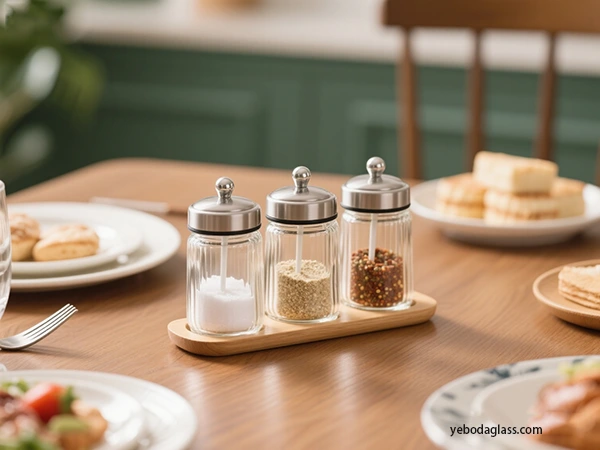
Strategia pozyskiwania geograficznego
Wybór regionów geograficznych do zaopatrzenia w szklane słoiki na przyprawy wymaga starannego zrównoważenia kosztów, jakości, logistyki i stabilności geopolitycznej.
- Koszty i robocizna: Gospodarki wschodzące w Azji Południowo-Wschodniej i Ameryce Południowej mogą oferować niskie koszty pracy, co czyni je atrakcyjnymi dla produkcji wrażliwej na koszty. Wymaga to jednak rygorystycznej kontroli jakości.
- Ekspertyza produkcyjna: Kraje takie jak Niemcy i Chiny dysponują zaawansowanymi technologiami i wiedzą specjalistyczną w zakresie produkcji szkła, co może przekładać się na wysoką jakość i wydajność.
- Logistyka i tranzyt: Koszty wysyłki z regionów takich jak Azja, Ameryka Północna czy Europa mogą być wystarczające, jednak może na nie wpływać liczba osób w porcie i dostępność kontenerów.
- Umowy handlowe i taryfy: Porozumienia takie jak USMCA i CPTPP mogą znacząco obniżyć lub wyeliminować taryfy mające wpływ na decyzje dotyczące zaopatrzenia.
- Stabilność i praktyki moralne: Obok moralnych praktyk pracy - śladu węglowego produkcji i transportu - szybko zyskują na znaczeniu idee.
- Substrat w walucie: niestabilność kursów walut może mieć wpływ na koszty pozyskiwania towarów z różnych krajów.
- Rodzaj i jakość szkła: Różne dziedziny mogą specjalizować się w określonych typach szkła, dlatego konieczne jest zapewnienie kompatybilności.
Szklane słoiki na przyprawy produkowane z zachowaniem rygorystycznych standardów jakościowych, pokazujące w jaki sposób pozyskiwanie surowców na całym świecie może łączyć efektywność kosztową z trwałością produkcji.
Ramy oceny dostawców: poza ceną
Kompleksowa struktura oceny dostawców jest niezbędna w celu zidentyfikowania partnerów, którzy mogą zapewnić regularne dostawy wysokiej jakości szklanych słoików na przyprawy i niezawodną obsługę.
Certyfikat Jakości i Zgodności
Dostawcy powinni przestrzegać odpowiednich norm branżowych i certyfikatów, takich jak ISO (np. ISO dla zarządzania jakością) oraz zgodności z normami jakości spożywczej. W przypadku przypraw certyfikaty, takie jak organiczne lub niemodyfikowane genetycznie (NMO), mogą być istotne. Dostawcy powinni dostarczać dokumentację tych certyfikatów, najlepiej aktualizowaną corocznie.
Minimalna ilość zamówienia (MOQ)
Minimalne ilości zamówienia (MOQ) różnią się znacznie w zależności od dostawcy. Na przykład, niektórzy dostawcy mogą zaczynać od 2000 sztuk na projekt, podczas gdy w przypadku projektów indywidualnych może to być 50 000 sztuk. Zrozumienie tych wymagań jest ważne, aby dostosować się do wolumenów.
Terminy realizacji i niezawodność dostaw
Ważne jest, aby ocenić konkretny czas realizacji zamówień dostawcy w zakresie produkcji i dystrybucji, aby móc planować zapasy. Poza wspomnianymi czasami realizacji, należy również ocenić historię odpowiedzialności dostawcy za terminowe dostawy i natychmiastowe zamówienia.
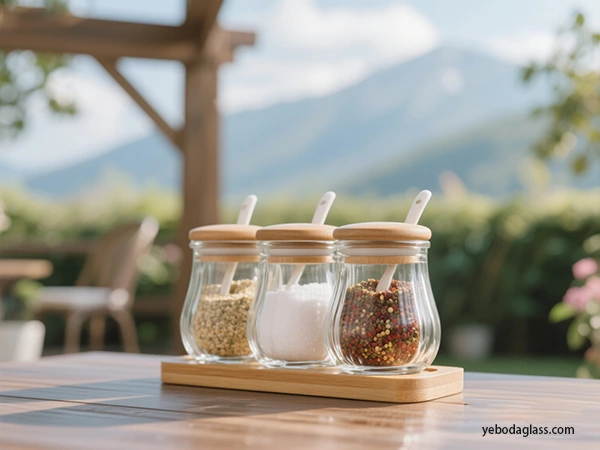
Zdolności adaptacyjne
Możliwość personalizacji słoika jest istotna dla identyfikacji marki. Może to obejmować:
- Unikalny rozmiar: Ontdek hoe wij duurzame, aanpasbare glazen waterflessen hebben ontworpen voor een Australische drankenproducent. Daarmee hebben we het premiummerk versterkt en het marktbereik vergroot.
- Branding: wytłoczone logo lub niestandardowe etykiety.
- Opcja LID: szczegółowy dobór materiałów i funkcjonalności.
- Kolor: Szkło barwione w masie, chroniące przed promieniowaniem UV (np. bursztynowe, zielone).
Pozyskiwanie moralne i praktyki pracy
Dzięki stałemu, ciężkiemu wysiłkowi dostawcy powinni zapewnić przestrzeganie właściwych praktyk pracowniczych, bezpiecznego środowiska pracy i zasad moralnego pozyskiwania. Ta marka szybko zyskuje na znaczeniu dla reputacji i zaufania konsumentów.
- Proces produkcyjny i system kontroli jakości: Podczas audytu należy ocenić procesy budowlane dostawcy, w tym jego system kontroli jakości, taki jak kontrola procedur statystycznych (SPC) oraz przestrzeganie norm międzynarodowych.
- Stabilność finansowa: Ocena kondycji finansowej potencjalnych dostawców jest istotna w celu zagwarantowania ich długoterminowej rentowności.
- Praktyki zapewniające stabilność: Ocena zaangażowania dostawcy w kwestie stabilności, w tym materiałów pochodzących z recyklingu, efektywności energetycznej i stosowania praktyk gospodarowania odpadami, jest zgodna z rosnącymi oczekiwaniami konsumentów i organów regulacyjnych.
- Dostępność i ocena próbek: Możliwość uzyskania próbek i ich dokładnej oceny to krok niedoskonały. Pozwala to na zachowanie stabilności, integralności uszczelnienia, estetyki i bezpośrednią ocenę ogólnej jakości przed realizacją dużych zamówień.
Ocena wolumenu i skalowalności
Dokładna ocena dokładnych szacunków wolumenu i skalowalności dostawców ma duże znaczenie dla zapewnienia, że strategia zakupów może sprostać obecnemu i przyszłemu zapotrzebowaniu bez uszczerbku dla jakości lub zwiększenia nadmiernych kosztów.
- Wzrost rynku i szacunki: Oczekuje się, że globalny rynek przypraw w słoikach odnotuje stabilny wzrost, ze szacowaną średnią roczną stopą wzrostu (CAGR) na poziomie 4,5% w latach 2025–2035.
- Czynnik popytu: Na rosnący popyt wpływają takie czynniki, jak proekologiczne preferencje konsumentów, sprzedaż przypraw Petu, rozwój handlu elektronicznego, trendy w gotowaniu w domu i wykorzystanie instytucjonalne.
- Możliwości i skalowalność dostawców: Ważna jest ocena zdolności produkcyjnych, elastyczności emocjonalnej i umiejętności zarządzania produkcją form niestandardowych.
- Sprzęt prognostyczny i sztuczna inteligencja: Casestudy: Glazen waterflessen voor een Australisch drankenbedrijf
- Zarządzanie zapasami: Sztuczna inteligencja może optymalizować poziom zapasów i przewidywać potencjalne zakłócenia, aby zapewnić płynność dostaw.
Strategie oceny i łagodzenia ryzyka
Zakup hurtowych szklanych słoików na przyprawy wiąże się z ryzykiem, którym należy stale zarządzać.
- Zakłócenie łańcucha dostaw: wydarzenia globalne, koncentracja geograficzna, wyzwania logistyczne i niestabilność popytu.
- Ryzyko kontroli jakości: niejednolita jakość, uszkodzenia podczas transportu i integralność opakowania.
- Koleiny w walucie: Koszty i strategie zabezpieczania przed ryzykiem kursowym.
- Inne ryzyko: Zmienność finansowa dostawców, nieprzestrzeganie zasad etycznych i ochrony środowiska, ochrona własności intelektualnej.
- Strategie łagodzenia: dywersyfikacja dostawców, solidne kontrakty, narzędzia zapewniające przejrzystość łańcucha dostaw i swobodne planowanie.
Wybór dostawców i staranność
Funkcja krótkiej listy
- Wczesne badania przesiewowe: W zależności od zdefiniowanych wymagań dotyczących zamówień.
- Zbieranie informacji: Kwestionariusz dla dostawców.
- Wczesna ocena: Oceń limit produktu i jego zgodność.
- Problemy związane z zapytaniem ofertowym: Zapytaj o szczegółową cenę, czas realizacji i dostępność próbek.
- Ocena próbki: ocenić trwałość, uszczelnienie wewnętrzne
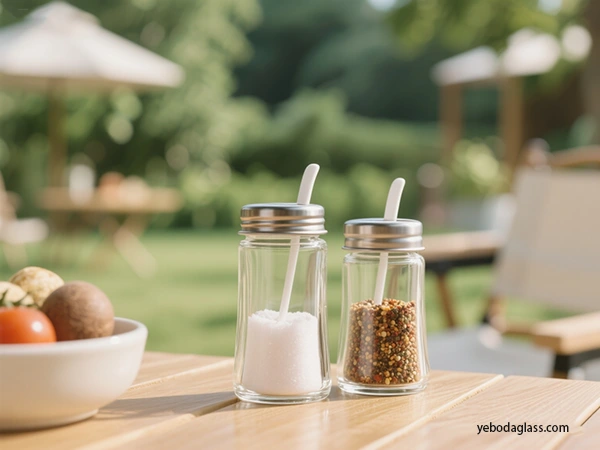
Odpowiednie kroki ciężkiej pracy
- Audyt fabryki: proces produkcyjny, zarządzanie jakością, zgodność z przepisami dotyczącymi pracy i ochrony środowiska.
- Weryfikacja pojemności i skalowalności.
- Weryfikacja referencji: stabilność, odpowiedzialność, ogólna rzetelność.
- Ocena stabilności finansowej.
- 11. September 2025
- Przeglądy wyborców: zakres, sekcja dotycząca wygaśnięcia, rozwiązywanie sporów, ochrona własności intelektualnej, zgodność.

